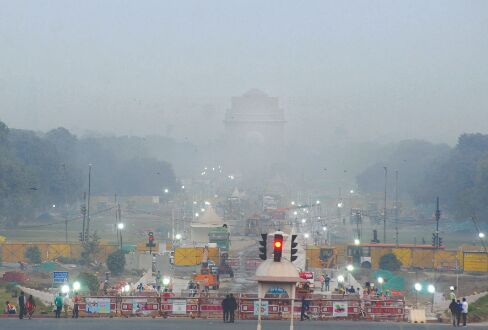People in 5-star hotels keep blaming farmers, what action on gas-guzzlers, hi-fi cars, asks SC

New Delhi: The Supreme Court on Wednesday came down heavily on authorities in the National Capital Region for once again trying to seek measures against pollution from stubble burning and said that despite everyone agreeing that vehicular and industrial pollution are major sources, no one was doing anything concrete to stop "gas-guzzling" industries and "hi-fi" cars. Holding that farmers' circumstances should be considered, the top court on Wednesday directed all NCR states to strictly implement the directions issued by the Commission for Air Quality Management in the NCR and adjoining areas - as issued on Tuesday night after an emergency meeting.
But before doing so, the court took a serious view of the bureaucracy, noting that the affidavits submitted by the Centre and other state governments had not highlighted any action that can be taken to curb vehicular pollution and pollution coming from construction sites.
While directing the authorities to follow the CAQM directions, the court observed that it cannot get into the nitty-gritty and that bureaucracy had developed a "sort of inertia" of not taking decisions that are being left to the courts.
The Commission for Air Quality Management in the NCR and Adjoining Areas, which held the meeting at the direction of the apex court on Tuesday with the Centre, Delhi, Haryana, Uttar Pradesh, Punjab and Rajasthan, came out with a slew of emergency steps to deal with industrial pollution, thermal plants, vehicular emissions, dust control, diesel generators as well as encouraging work from home.
A bench headed by Chief Justice N V Ramana, which heard the case for over two hours, said, "Enough is enough... You please take the steps to deal with the emergency situation."
Referring to the affidavits of the Centre and others, the bench, also comprising Justices D Y Chandrachud and Surya Kant, said that at one place they could have said the actions they proposed to take to deal with the situation.
The CJI then said: "Over a period of time what I am observing, as a judge and an Advocate General, is that the bureaucracy, completely, I think has developed some sort of inertia. They don't want to take a decision. How to stop a car, seize a vehicle, how to stop a fire has to be done by this court. Everything we have to do. This is an attitude developed by the Executive."
"It is apathy and just apathy," he said while fixing the case for further hearing on November 24, after Solicitor-General Tushar Mehta sought that no directions be passed until November 21, by which time the weather is expected to help clear some of the pollution. To this, the bench said, "Basically by November 21, nature will come to your rescue," before posting the matter for next hearing.
"People sitting in five and seven star hotels here keep blaming farmers, that 4-5 per cent is attributed to them. After agrarian laws, what happened to their land holdings? With such small land holdings, can they afford these machines? If you actually have any scientific alternative, propose it to them, they will adopt them," it said.
It has been acknowledged that vehicular pollution is the major source of pollution and still "gas guzzlers and hi-fi cars" are plying on Delhi roads and nothing is being done, the bench said.
"All of you in your affidavits are acknowledging, for example, that transportation is a pollution source. We know that all gas guzzlers, tractors, hi-fi cars are plying in Delhi on every route. You are saying you will encourage people to stop it. Now how will you do this and who will encourage and who will accept" it said.
Mehta then took the court through the directions issued by the CAQM late on Tuesday night such as shutting 6 of 11 thermal power plants, banning the entry of trucks into the Capital, mandating 50 per cent work from home for government staffers.
During the hearing, the bench took note of debates on electronic media and said that TV news channels are causing more pollution than anybody with statements made in the court being taken out of context.
"Debates on TV are creating more pollution than anybody. They don't understand what is happening and what is the issue. Statements are taken out of context. Everyone has their own agenda. We can't help and we can't control. We are focussing on working out the solution," it said.
The oral remarks came in response to the submission of senior advocate Abhishek Manu Singhvi, appearing for the Delhi government, that stubble burning was one of the contributors of the air pollution which needs to be addressed and referred to the Centre's figures on the issue.
Mehta said the issue of work from home for central government officers was also considered but the number of vehicles used by them is not huge. He had argued against this for Central government staffers, saying this would have an effect on the administration of all of India and not just Delhi.
However, the court pointed out that the government had done the same for staffers when Covid-19 was surging and also suggested that many government employees live in government quarters, from where they can be carpooled to work. Following this, the Centre announced that it had instructed its staffers in the NCR to use public transport.
The apex court also asked Haryana about the steps taken to control air pollution. The bench asked, "What about work from home? The deputy commissioner of Gurugram, Faridabad, Sonepat and Jhajjar were ordered to follow work from home. What has happened." The counsel said that they have been told to do so.
The apex court took exception and said, "Told to do means you've left it at their discretion. What have you done?



